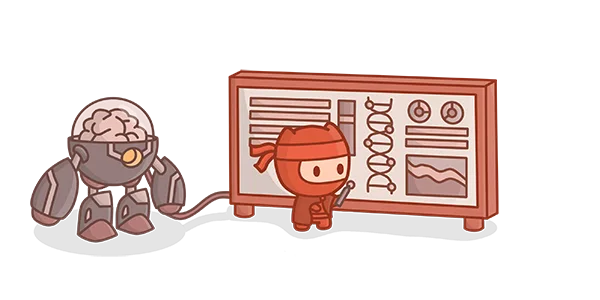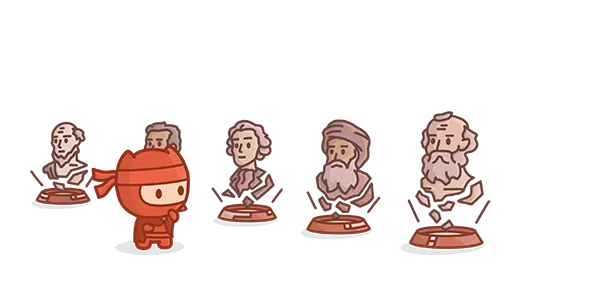
Building on Insight
Dominant Aspects
If humans were computers, our dominant traits would be the operating system that is embedded and hard-coded in our minds. These deeply ingrained behaviors run on autopilot, driving our every action without conscious thought. Like breathing or blinking, we can actively choose to control our actions with enough concentration. However, most of the time, our recurring behaviors seem to be driven by our subconscious, functioning effortlessly and instinctively.
Instinct is a marvelous thing. It can
neither be explained nor ignored.
Agatha Christie
Dominant traits are often mistaken as strengths in most other personality systems. But here in Personality Ninja, we hold a different view. To us, traits are just traits, shaped by the wiring of our cognitive functions. Whether a trait is good or bad largely depends on the way it is used. As such, these traits can either be the source of one's greatest strengths, or the cause of their biggest downfall.
Naturally, we will hone our dominant traits, refining them into our super strengths. However, if we are not careful, there is a chance that we may push our dominant traits into overdrive, manifesting them in very unhealthy ways. In the end, our dominant traits are our natural tendencies and nothing more. The key to harnessing them effectively lies in knowing when, where, and how to use them.
From String Theory to Evolution, the greatest answers always begin with a critically thought out hypothesis. Theorists have a unique ability to identify logical patterns behind the most ordinary of observations, enabling them to establish connections even when the information is scarce and scattered. By approaching issues in an intuitive and logical manner, they can accurately deduce the true cause of an occurrence, granting them a comprehensive understanding of any situation.

Despite their keen analytical abilities, Theorists may struggle with navigating social contexts. Being independent thinkers who prioritize individual logic, they might not always take other people into account when making decisions. Hence, when their actions bring trouble upon others, they may face immense backlash for being self-centered, which can make it difficult for them to function effectively in society.
To make matters worse, their tendency to draw conclusions entirely from within the confines of their minds might lead to delusional thoughts, where misleading visions are indistinguishable from reality. Much like the people in Plato's allegory of the cave, Theorists may see themselves as all-knowing, rejecting any external viewpoint that could possibly prove them wrong. As a result, their understanding of reality becomes restricted to their limited knowledge, giving them a false idea of what reality truly is.
Like Einstein and his theory of relativity, Theorists seek to develop comprehensive universal frameworks; ones that can explain everything from human suffering to political ideologies. They do this by grasping the fundamental concepts behind everyday ideas, piecing them together like a puzzle of life. By doing so, they are able to develop holistic thought systems, providing them accurate answers through a complete understanding of any problem.

Nevertheless, every framework will have its flaws. Theorists often fail to realize that the perfect model is merely an ideal, not something that can actually exist. Thus, they tend to overestimate the applicability of their frameworks, never once doubting themselves. Ignorant to reality, such Theorists will remain stuck to their own methods, always approaching problems the wrong way round.
On top of that, when unhealthy Theorists become overly attached to their frameworks, they may adamantly claim that their methods are the best, rejecting alternative solutions without even considering them. Theorists who do this may think that they are being committed to logic. But in truth, they are merely stubborn, insisting on their ways even when society has already proven them wrong.
When Theorists inquire into a hypothesis, they never lose sight of the fundamentals of an idea. By examining the central aspects of a subject matter, they can easily assess and pinpoint the logical flaws embedded deeply within it. Theorists seek to dissect issues to their finest atom and scrutinize the inner workings of any system. By understanding an idea thoroughly, Theorists can ensure that the conclusions they reach are logically irrefutable, removing all instances of uncertainty.

However, Theorists tend to overanalyze things, causing them to focus on insignificant elements. They will nitpick on every little flaw in an idea, demanding absolute precision. This obsession with logical accuracy will interfere with progress, preventing issues from moving forward. Truth is, most situations in life involve some degree of ambiguity. If Theorists do not learn to embrace this, they will gradually become disconnected from reality.
Worse yet, Theorists can become hypercritical, habitually seeking out problems where none exist. They might approach life with pessimism, viewing all matters in a negative light. Hence, the strengths of an idea may be overlooked entirely, only to be supplanted by an overemphasis on its shortcomings. This attitude will only lead to Theorists becoming exceedingly dissatisfied, living life in a constant state of despair.
To stand tall, one must plant their feet on solid ground. Principles are the foundation to a Theorist's thoughts, ideas, and beliefs. Therefore, they will make every effort to formulate ones that are universally true. Theorists do this through the process of reflection, distilling ideas down to their fundamental concept and incorporating them into their personal truths. With this, Theorists can live their lives according to their ideals without ever going astray.

However, these principles might only be applicable to the creator themselves. Many Theorists spend time refining ideas entirely on their own, rarely seeking external input. So, while Theorists might consider their own principles to be accurate, they may actually be irrelevant to the rest of society. If a principle is not reviewed by others, it will lack credibility, which means that Theorists may never be certain whether their beliefs are universally true.
Worst of all, if left unchecked, the principles of Theorists may end up being terribly subjective and self-serving, making them susceptible to personal bias. Should that happen, Theorists might become blind to their intentions and begin to act solely for their own benefit. Ultimately, this self-centered mindset can ultimately lead to the destruction of Theorists, resulting in a desolate and lonely existence.
To wrap it up, dominant traits are neither our strengths nor are they our weaknesses. They are simply traits we tend to exhibit naturally in our daily lives without much realization.
The biggest reminder here is this: a trait is a trait. It is a unique characteristic of an archetype, each carrying its own pros and cons. With that understanding, let us now venture into the next set of traits that we do more consciously—our supportive traits.
Read next section →
Supportive Traits [Theorist]